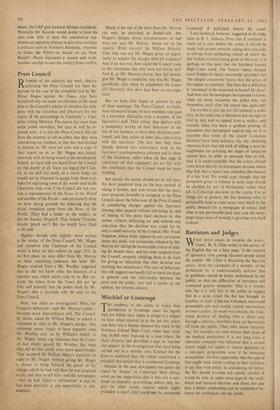Mischief or Contempt
Tin: tendency of the courts to widen their jurisdiction in Contempt cases (as legally they are within their rights in doing) is a subject we have often referred to in the last few years; and there was a further instance last week in the Northern Ireland High Court, when fines total- ling £6,800 were imposed in a case where the Daily Express had described a man as 'number one suspect' in the investigations that were being carried out in a murder case. Counsel for the Express' adMitted that the report constituted a mischief, but- denied that it constituted Contempt because in the past newspapers (to quote the report by 'Justice' on Contempt) 'have always acted on the supposition that it was not a con- tempt to prejudice proceedings before they be- gan'--in other words, reports which might prejudice a man's trial could not be accounted Contempt if published before his arrest.
Lord Goddard, however, suggested in his judg- ment in R. v. Whams Press that if comment is made on a man before his arrest, it should be made with proper restraint, taking care especially to refrain from publishing matter of which the law forbids evidence being given at the trial': it is perhaps on this basis that the Northern Ireland High Court acted. The 'Justice' report thought Lord Goddard's thesis reasonable, provided that 'the alleged contemnor knows that the arrest of the suspect is imminent.' But here lies a difficulty. Is 'imminent' to be measured in hours? Or days? And how can the newspaper be expected to know, when on many occasions the police may not themselves until after the report has appeared?
The trouble is that the law of Contempt is arbit- rary, in the sense that a defendant has no right to trial by jury and no appeal from a verdict; and recently there has been a gradual eroding of precedents that newspapers used to rely on. It is arguable that some of the courts' Contempt decisions have been salutary—by, say, deterring reporters from that old trick of telling a man his neighbours are pointing the finger of suspicion against him, in order to persuade him to talk. And it is understandable that the courts should' come down heavily on newspapers in cases where they feel that a report may prejudice the chances of a fair trial. We would urge, though, that the protection given to citizens in such cases should be clarified by Act of Parliament, rather than left to Contempt decisions in the courts. For as things are at present, the line between what is permissible (and in some cases, very much in the public interest) for a newspaper to reveal, and what is not permissible (and may cost the news- paper large sums of money), is growing very hard to draw.






































 Previous page
Previous page